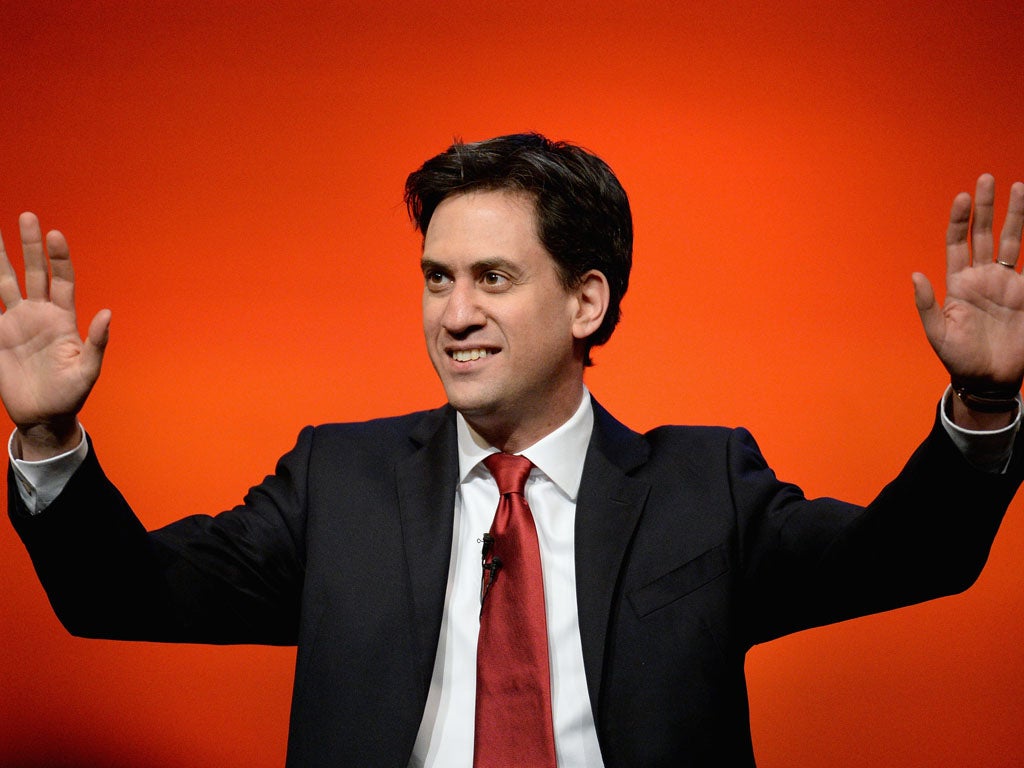So what if people think Ed Miliband is weird? Leadership is not a popularity contest
Qualities that people like at school can contrast dramatically with qualities that deem them fit to run the country

Your support helps us to tell the story
From reproductive rights to climate change to Big Tech, The Independent is on the ground when the story is developing. Whether it's investigating the financials of Elon Musk's pro-Trump PAC or producing our latest documentary, 'The A Word', which shines a light on the American women fighting for reproductive rights, we know how important it is to parse out the facts from the messaging.
At such a critical moment in US history, we need reporters on the ground. Your donation allows us to keep sending journalists to speak to both sides of the story.
The Independent is trusted by Americans across the entire political spectrum. And unlike many other quality news outlets, we choose not to lock Americans out of our reporting and analysis with paywalls. We believe quality journalism should be available to everyone, paid for by those who can afford it.
Your support makes all the difference.What qualities do we want in leaders? It’s a tough question. But one of the things we absolutely do not want, apparently, is “weirdness.” The ‘Ed Miliband is weird’ poll posits it as an insurmountable problem that Miliband is perceived as “weird” and “likely to have been bullied at school.”
Miliband has always been dismissed as “weird,” and “geeky” so it’s hardly a new attack. But the implication coming from the likes of Paul Staines, and the Mail, among others, is that being “weird” is a terrible weakness. This line of attack might seem tempting, especially to the vindictive. It could work. But it could also backfire on the Tories.
For it to work, David Cameron would have to be everyone’s idea of an ordinary bloke. Buzzfeed illustrated their coverage of the poll with a Grant Shapps tweet: “I’m the millionaire son of a Marxist, who’s spent my whole life in political jobs. That’s why I understand ordinary people.” That’s a fair accusation, but Cameron got his first job because a royal equerry put in a good word for him, and his second on the recommendation of his mother-in-law Lady Aston. Do the Tories really want to pull at that thread?
And qualities that make somebody “popular at school” can contrast dramatically with qualities that deem them fit to run the country. According to the poll, Miliband is seen as most likely to have been “bullied” - but also as most hard-working.
To see the antithesis of Miliband the Geek, we needn’t look far – our tellies are perpetually blessed these days with the delightful countenance of Nigel Farage. Farage is an ordinary bloke because he drinks pints. Farage isn’t part of the political class, man! (Even though, by definition, he literally is.) Farage gets all the good adjectives. “Charming.” “Likeable.” “Normal.”
So what of their politics? Well, let’s compare: Miliband was campaigning for a living wage, back when the notion of such a thing was sneered at, if uttered publicly at all. Now the campaign for the living wage is a credible, cross-party campaign.
Meanwhile, Farage’s party, in a manifesto Farage helped launch, then claimed he hadn’t read, advocated scrapping maternity rights and all equalities legislation.
At the Labour conference, Miliband announced an energy price freeze, because in a recession, people struggle with heating bills. It was shouted down by the country’s biggest papers – not to mention energy companies. Tories howled with laughter, before desperately coming up with some attempt at a consumer-friendly energy policy themselves, because, unsurprisingly, Miliband’s freeze was popular.
At the Ukip spring conference, the booked comedian made a series of jokes about Asians, Muslims, and Poles. Our cheeky, pint-downing mate Nigel defended the jokes, because they were “national stereotypes, not racial.”
Geeky Miliband stood up to Murdoch over phone-hacking while loveable Boris Johnson dismissed the whole thing as “codswallop.” On key moral issues like marriage equality, and the Macphearson report, Boris Johnson’s comments seem to start off in support of inequality; taking the side of what is "normal" not what is right. Of course, like all likeable, normal people, he does listen to public opinion, but only once each argument has been won by others.
So perhaps Miliband is a little weird. So what? Being “normal” and using “common sense” is not leadership. Leadership is not cow-towing to power then changing your story to cover yourself. Leadership is not a popularity contest. It is standing up for what’s right, even when it’s tough. And after all, it’s easy to avoid “weirdness” if you have no character – or conscience.
Join our commenting forum
Join thought-provoking conversations, follow other Independent readers and see their replies
Comments